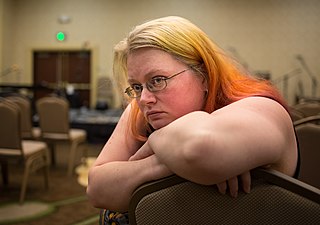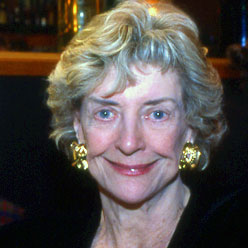A Quote by Charles Bukowski
I have seen too many men wilt and go silly under a little light, and then they continue to write and get published, turning out pure crap under a name that has become a bad habit. The next poem is all that counts. You can't stand on past poems.
Related Quotes
I started out in graduate school to be a fiction writer. I thought I wanted to write short stories. I started writing poems at that point only because a friend of mine dared me to write a poem. And I took the dare because I was convinced that I couldn't write a good poem... And then it actually wasn't so bad.
I didn't think [Ella Enchanted] would get published. Everything I'd written till then had been rejected. If it was published, I thought it might sell a few thousand copies and go out of print. I thought if I was lucky I could write more books and get them published, too. I still pinch myself over the way things have worked out.
A successful poem says what a poet wants to say, and more, with particular finality. The remarks he makes about his poems are incidental when the poem is good, or embarrassing or absurd when it is bad and he is not permitted to say how the good poem is good, and may never know how the bad poem is bad. It is better to write about other people's poetry.
I like to think of myself as a reasonable man. But I have buried too many friends in the too-recent past, and I have seen too many lies go unquestioned, and too many questions go unasked. There is a time when even reasonable men must begin to take unreasonable actions. To do anything else is to be less than human.
I was walking every morning, and I'd take my iPod and paper and pen.?As I walked, I wrote a poem, and then I'd come home - and sometimes it's legible, sometimes not - I typed the poem up. So I have a new, yet to be published, collection of poems now. It's called Walker's Alphabet, and among other things, it is about walking. My most recent collection of poems in 2010, incidentally, was titled WALKING backwards.
Poems, to me, do not come from ideas, they come from a series of images that you tuck away in the back of your brain. Little photographic snapshots. Then you get the major vision of the poem, which is like a giant magnet to which all these disparate little impressions fly and adhere, and there is the poem!
Introduction To Poetry I ask them to take a poem and hold it up to the light like a color slide or press an ear against its hive. I say drop a mouse into a poem and watch him probe his way out, or walk inside the poem's room and feel the walls for a light switch. I want them to waterski across the surface of a poem waving at the author's name on the shore. But all they want to do is tie the poem to a chair with rope and torture a confession out of it. They begin beating it with a hose to find out what it really means.
I wrote a number of poems about Kah Tai lagoon, when Safeway was building that huge, ugly store down there where I used to love to watch the birds nest. That political poem, or environmental poem, was unsuccessful because Safeway built there anyway. And yet the poem has something to say today, as it did then. And I speak here only of my own poems. The agenda for every poet has to be different because most of us write from direct human experience in the world.
Most of the poems I write go through forty versions and then stay in a file on my computer. I'm not very good at sending stuff out or feeling that something is ready to send out and I never have been. Part of the problem is that as soon as a poem is finished, it stops being all that interesting to me.
I don't go to an office, so I write at home. I like to write in the morning, if possible; that's when my mind is freshest. I might write for a couple of hours, and then I head out to have lunch and read the paper. Then I write for a little bit longer if I can, then probably go to the library or make some phone calls. Every day is a little bit different. I'm not highly routinized, so I spend a lot of time wandering around New York City with my laptop in my bag, wondering where I'm going to end up next. It's a fairly idyllic life for someone who likes writing.





































